A collection of common English football vocabulary
Mastering English football vocabulary will not only enhance your communication skills but also significantly boost your performance in language proficiency exams such as IELTS and TOEIC. Therefore, there's no reason to hesitate—join PREP now, and let's learn the most common football-related vocabulary together!
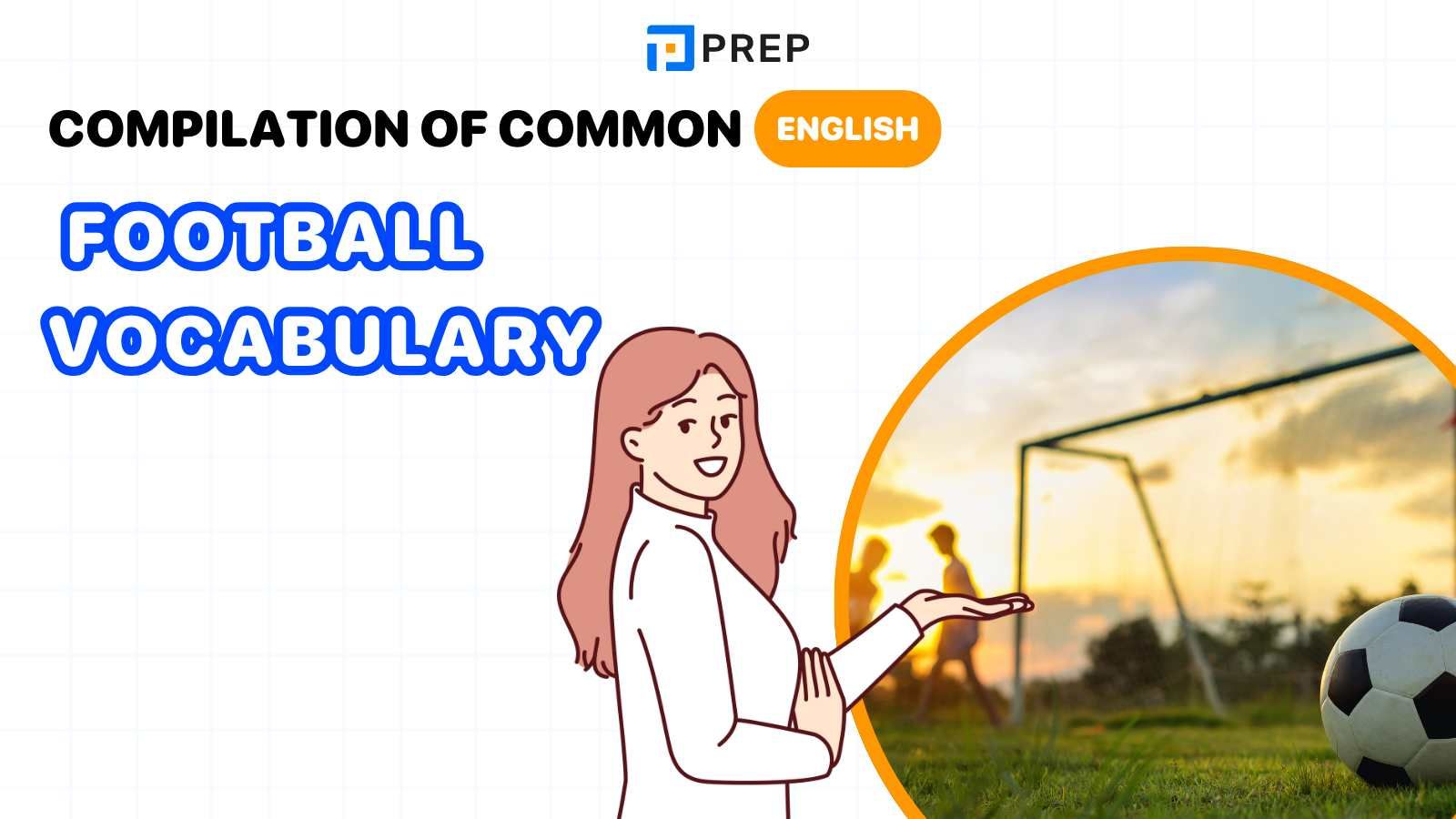
I. What is football in English?
In English, there are two terms soccer /ˈsɑː.kɚ/ and football /ˈfʊt.bɑːl/. Among these, "soccer" is the term used more frequently by Americans, while "football" is more commonly used by the British.
In the U.S., there is a sport called "American football," which means "rugby." Therefore, in the U.S., if you use "football" to refer to soccer, many people may confuse it with the sport of rugby. Therefore, depending on which country you are in, pay attention to choose the correct term!
II. English football vocabulary list
1. Players on the Field
In the football/soccer vocabulary, the players on the field are commonly referred to by the following terms:
|
No |
Word |
Meaning |
Example |
|
1 |
Starting lineup /ˈstɑːrtɪŋ ˈlaɪnˌʌp/ |
The group of players who begin a match on the field for a team. |
The starting lineup was announced just before 7 am yesterday. |
|
2 |
Goalkeeper /ˈɡəʊlˌkiː.pər/ |
The player in a football or soccer team who is positioned in front of the goal and is responsible for stopping the opposing team from scoring |
The crowd in the stands cheered as the goalkeeper blocked the shot. |
|
3 |
Defender /dɪˈfen.dər/ |
A player whose primary role is to prevent the opposing team from scoring by stopping attacks and tackling opponents |
This player dribbled past a defender andfired the ball right into the goal. |
|
4 |
Midfielder /ˌmɪdˈfiːl.dər/ |
A player who primarily plays in the middle of the field, linking the defense and attack, and often involved in both defending and creating goals |
Those midfielder players believed the historic loss was the entire team's fault. |
|
5 |
Forward /ˈfɔː.wəd/ |
A player positioned near the opponent's goal, whose main responsibility is to score goals |
The Chilean forward still scored 2 goals despite being injured. |
|
6 |
Substitute /ˈsʌb.stɪ.tʃuːt/ |
A player who is not in the starting lineup but can replace another player during the match |
The substitute player of this team was brought onto the field in the 85th minute. |
|
7 |
Referee /ˌref.əˈriː/ |
The official in charge of enforcing the rules of the game during a match, making decisions about fouls and other incidents |
Referee Kovacs issued 16 yellow and 2 red cards in the Czech Republic match. |
|
8 |
Manager /ˈmænɪdʒər/ |
The individual responsible for coaching the team, making tactical decisions, and managing player performance |
The manager breathed a sigh of relief when the players scored a goal in the last minute of the match. |
|
9 |
Linesman /ˈlaɪnzmən/ |
An assistant referee positioned along the sidelines, responsible for signaling offsides and other infractions |
The linesman is observing that team's corner kick. |
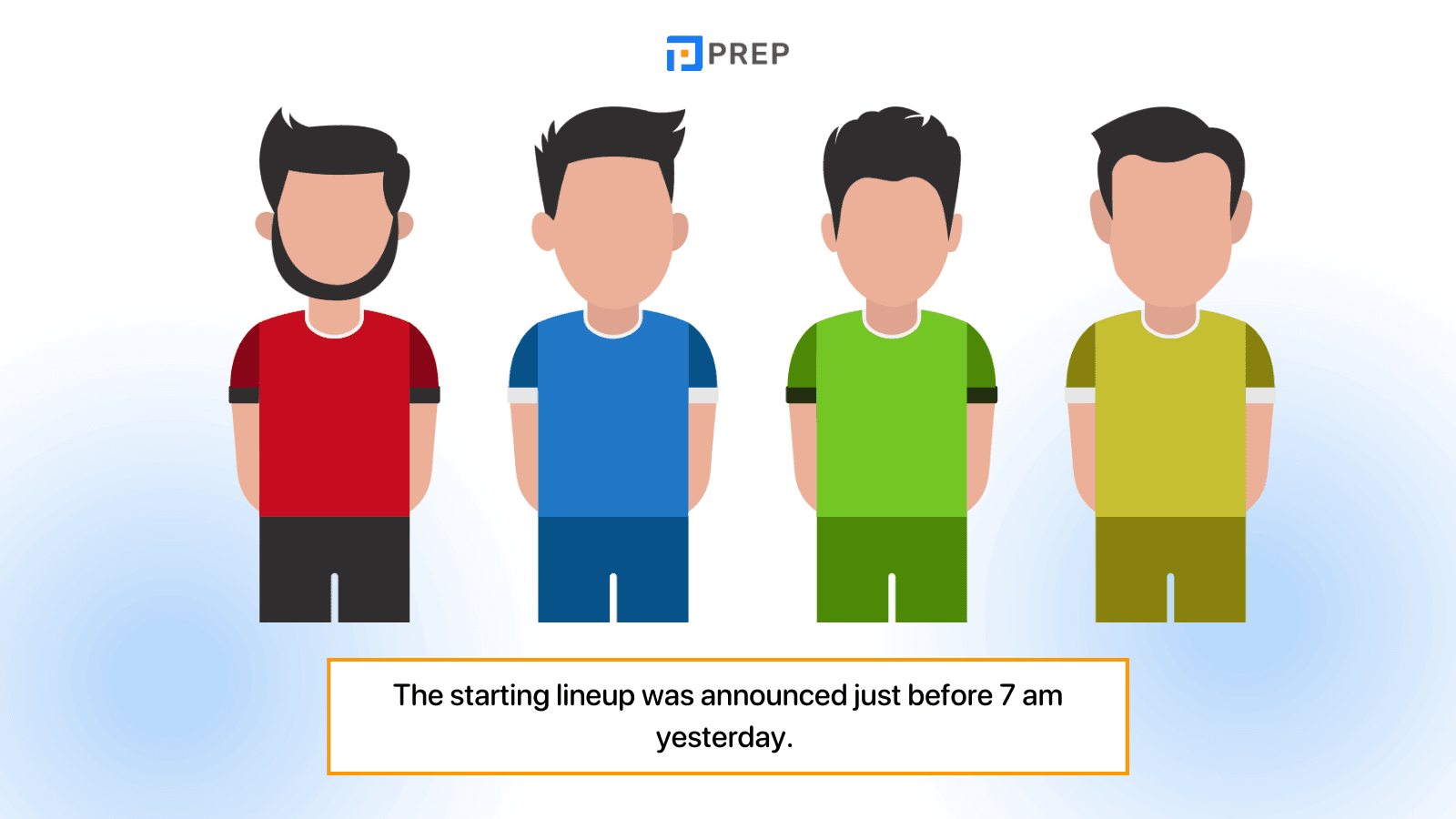
2. Areas on the Football Field
Next, when learning football English vocabulary, let's not forget to pay attention to the various areas and parts of the football field:
|
No |
Word |
Meaning |
Example |
|
1 |
Football pitch/ Soccer field /ˈˈfʊt.bɑːl pɪtʃ/ /ˈsɑːkər fiːld/ |
The playing surface for football (soccer), typically rectangular in shape, where the game is played. |
The Old Trafford soccer field's infrastructure has deteriorated and needs repair. |
|
2 |
Centre circle /ˌsen.tə ˈsɜː.kəl/ |
The circular area at the center of the pitch where kick-offs occur and is often marked for player positioning. |
The center circle is a circle with a radius of about 6m located in the middle of the field. |
|
3 |
Goal /ɡəʊl/ |
The structure consisting of two vertical posts and a crossbar that defines the scoring area; also refers to the act of scoring |
The goalkeeper defended the goal excellently. |
|
4 |
Goal line /ˈɡəʊl ˌlaɪn/ |
The line that runs across the width of the pitch, marking the boundary of the goal area; the ball must completely cross this line to count as a goal |
The goal line is located behind the goal on a soccer field. |
|
5 |
Touch line/ Sideline /tʌtʃ laɪn/ /ˈsaɪdlaɪn/ |
The lines that run along the length of the pitch; the game is restarted with a throw-in when the ball crosses these lines. |
The linesman always runs along the sideline of the football field. |
|
6 |
Halfway line /ˈhæfweɪ laɪn/ |
The line that divides the pitch into two equal halves; it marks the center of the field, often used for kick-offs |
The players gathered at the halfway line for the kickoff. |
|
8 |
Penalty spot /ˈpen.əl.ti ˌspɒt/ |
The designated spot 12 yards from the goal line, where penalty kicks are taken. |
The ball is moved by the referee to the penalty spot. |
|
9 |
Penalty area/ box /ˈpɛnəlti ˈɛriə/ /bɒks/ |
The rectangular area that extends 16.5 meters from the goal line, within which the goalkeeper can use their hands and where fouls can result in a penalty kick |
The players line up in a long line in the penalty area. |
|
10 |
Corner /ˈkɔːrnər/ |
The area at the corner of the pitch from which corner kicks are taken, usually marked with a quarter-circle. |
This player saved a goal by kicking the ball into the corner of the football pitch. |
|
11 |
Crossbar /ˈkrɔːsbɑːr/ |
The horizontal bar that connects the two goalposts at the top of the goal frame |
Luckily, the ball hit the crossbar and bounced back onto the field. |
|
12 |
Net /nɛt/ |
The mesh material attached to the goal frame that serves to catch the ball when a goal is scored |
The net shook as the striker scored a goal. |
|
13 |
Goalpost /ɡoʊl poʊst/ |
The vertical posts that form the sides of the goal structure. |
Chelsea's goalkeeper made a great save off the goalpost. |
|
14 |
Corner flag /ˈkɔːrnər flæɡ/ |
The flag placed at each corner of the pitch to indicate the boundaries of the corner area |
The player kicked the ball from the corner flag to set up a scoring opportunity. |
|
15 |
Bench /bɛntʃ/ |
The seating area for substitutes and coaching staff located along the side of the pitch |
The players sitting on the bench are discussing the opponent's strategy. |
|
16 |
Stands /stændz/ |
The seating area for spectators, typically elevated, providing views of the game. |
The fans sang the national anthem loudly and clearly in the stands. |
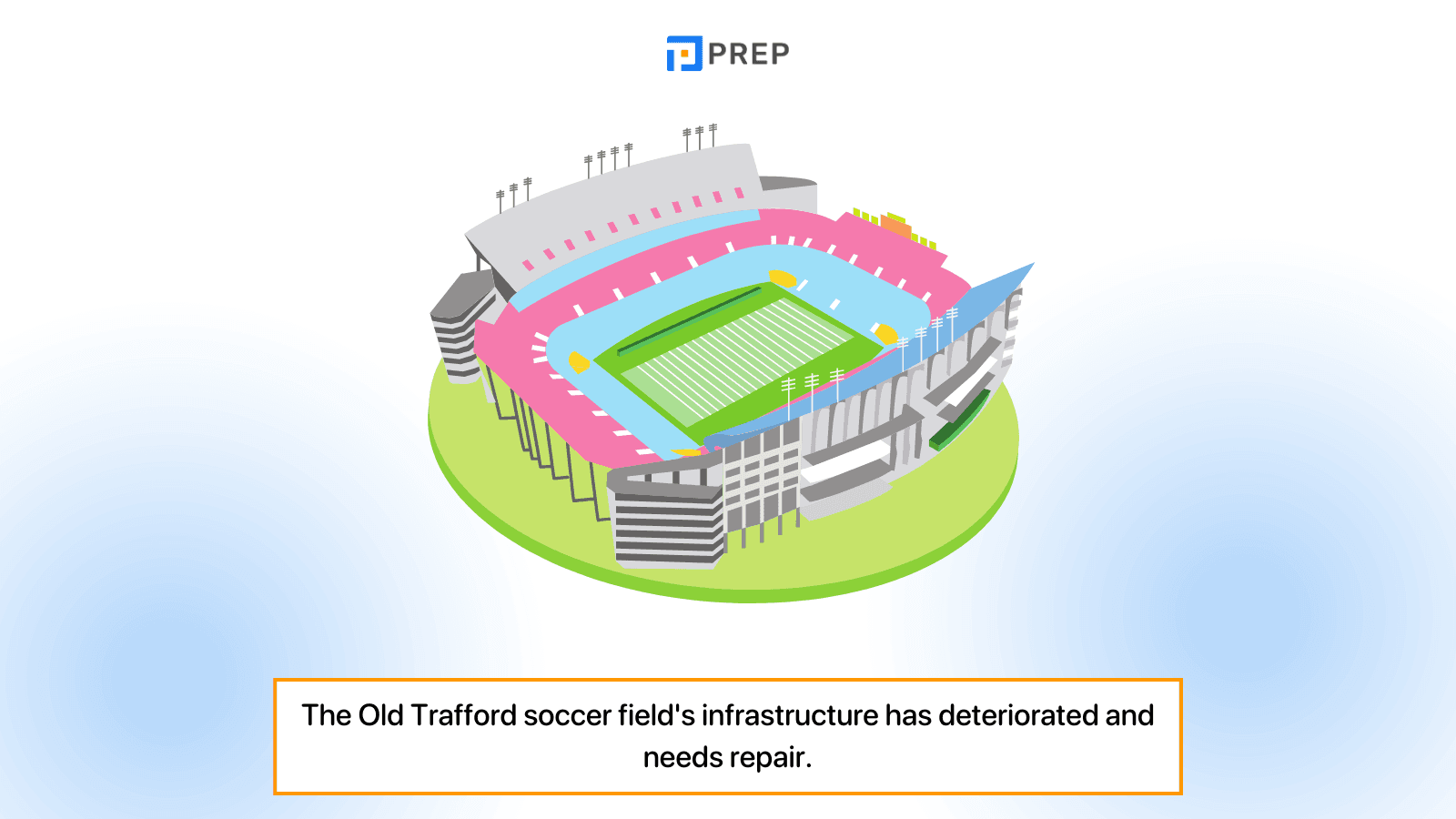
3. Actions and Situations Occurring During a Football Match
To describe the situations and activities that occur during a match, we will use the following football vocabulary:
|
No |
Word |
Meaning |
Example |
|
1 |
Half (n) /hɑːf/ |
One of the two equal periods into which a football match is divided, typically lasting 45 minutes. |
This is the first half of the match. |
|
2 |
Free kick (n) /ˌfriː ˈkɪk/ |
A kick awarded to a team after a foul is committed by the opposing team, taken from the spot of the infraction. |
Peter will take a free kick at the goal. |
|
3 |
Foul (v) /faʊl/ |
To break the rules of the game, typically by making illegal contact with an opponent. |
This player was fouled after the shot. |
|
4 |
Edge out (v) /ɛdʒ aʊt/ |
To win closely or narrowly in a competition or match. |
The Vietnamese team edged out the opponent with a two-to-one victory. |
|
5 |
Corner kick (n) /ˈkɔː.nə ˌkɪk/ |
A kick awarded to the attacking team when the ball goes out of play over the goal line, last touched by a defending player, taken from the corner of the pitch. |
Martin opened the scoring in that match with a corner kick. |
|
6 |
Extra time (n) /ˌek.strə ˈtaɪm/ |
An additional period of play added after a match ends in a draw, typically consisting of two halves of 15 minutes each. |
The Vietnamese team scored two times in extra time to win 3-1. |
|
8 |
Injury time (n) /ˈɪn.dʒər.i ˌtaɪm/ |
Additional time added to the end of each half to compensate for stoppages due to injuries, substitutions, or other delays. |
This match will have five minutes of injury time. |
|
9 |
Offside (n) /ˌɒfˈsaɪd/ |
A rule violation that occurs when an attacking player is in front of the last defender (excluding the goalkeeper) when the ball is played to them. |
Jessy had a goal disallowed for offside. |
|
10 |
Penalty (n) /ˈpen.əl.ti/ |
A kick awarded to the opposing team for a foul committed within the penalty area, taken from the penalty spot. |
The player took a deep breath before taking the penalty kick. |
|
11 |
Penalty shootout (n) /ˈpɛnəlti ˈʃuːtaʊt/ |
A method of determining the winner of a match that is tied at the end of extra time, where each team takes a series of penalty kicks. |
The match went to a penalty shootout after a 1-1 draw. |
|
12 |
Bicycle kick (n) /ˈbaɪsɪkəl kɪk/ |
A striking technique where a player kicks the ball while in mid-air, typically inverted, resembling a bicycle motion. |
The forward of that team scored with a great bicycle kick. |
|
13 |
Clearance (n) /ˈklɪrəns/ |
An act of defending where a player kicks or heads the ball away from their goal area to eliminate a scoring threat. |
The defender of Manchester United made a crucial clearance to prevent a goal. |
|
14 |
Dive (v) /daɪv/ |
To intentionally fall to the ground, often to simulate a foul or injury, typically to deceive the referee. |
The home team player tried to dive to win a free kick, but the referee did not recognize it. |
|
15 |
Draw/ Tie (n) /drɔː/ /taɪ/ |
A match result where both teams have the same score at the end of the game. |
The game between Borussia Dortmund and Heidenheim ended in a draw, with both teams scoring a goal. |
|
16 |
Equalizer (n) /ˈiːkwəˌlaɪzər/ |
A goal that brings the score of a game to a tie, typically scored after the opposing team has taken the lead. |
The equalizer came late in the second half, bringing the score to 3-3. |
|
17 |
Half time (n) /ˈhæf taɪm/ |
The break occurring between the two halves of a football match, typically lasting 15 minutes. |
The coach gathered the team together and discussed strategy during half-time. |
|
`18 |
Handball (n) /ˈhændbɔːl/ |
An infraction committed when a player deliberately touches the ball with their hand or arm. |
Unfortunately, a player from that team had a handball. |
|
19 |
Hat trick (n) /ˈhæt trɪk/ |
The achievement of scoring three goals in a single match by one player. |
The team's youngest forward scored a hat-trick. |
|
20 |
Header (n) /ˈhɛdər/ |
A play in which a player uses their head to strike the ball, often used to pass or shoot |
Bennet Omalu created a draw for his team with a header. |
|
21 |
Kick-off (n) /ˈkɪk ɒf/ |
The action that begins a match or restarts play after a goal is scored. |
The kick-off for the match between Latvia and Faroe was delayed due to heavy rain. |
|
22 |
Own goal (n) /oʊn ɡoʊl/ |
A goal that is accidentally scored by a player against their own team. |
Player Edgar Cunningham accidentally scored an own goal at a distance of 60 meters. |
|
23 |
Possession (n) /pəˈzɛʃən/ |
The act of having control of the ball during a match. |
The team had 60% possession throughout the game. |
|
24 |
Red card (n) /rɛd kɑːrd/ |
A card shown by the referee to indicate that a player has committed a serious foul, resulting in their expulsion from the match. |
The referee issued the first red card for the friendly match between the two countries. |
|
25 |
Yellow card (n) /ˈjɛloʊ kɑːrd/ |
A card shown by the referee as a warning to a player for minor infractions; two yellow cards in one match result in a red card. |
That player received a yellow card for disrespecting the referee. |
|
26 |
Shot (n) /ʃɑːt/ |
An attempt to score a goal by kicking, heading, or striking the ball towards the goal. |
No matter how dangerous his shot was, the goalkeeper still excelled in catching the ball. |
|
27 |
Throw-in (n) /ˈθroʊ ɪn/ |
The method of restarting play after the ball has gone out of play over the sideline, performed by a player using both hands to throw the ball back into play from the point where it exited. |
This player signals his teammates and begins to throw in. |
|
28 |
VAR (n) /viː-eɪ-ɑːr/ |
Video Assistant Referee; a technology used in football to review decisions made by the on-field referee with the help of video footage. |
The referee consulted VAR to review the controversial penalty decision. |
|
29 |
Wall (n) /wɔːl/ |
A formation of players standing in a line to block a direct free kick taken by the opposing team. |
The players formed a wall to block the free kick. |
|
30 |
Concede (v) /kənˈsiːd/ |
To allow a goal to be scored by the opposing team, resulting in them gaining a point in the match. |
The team had a strong defense but still conceded two goals in the match. |
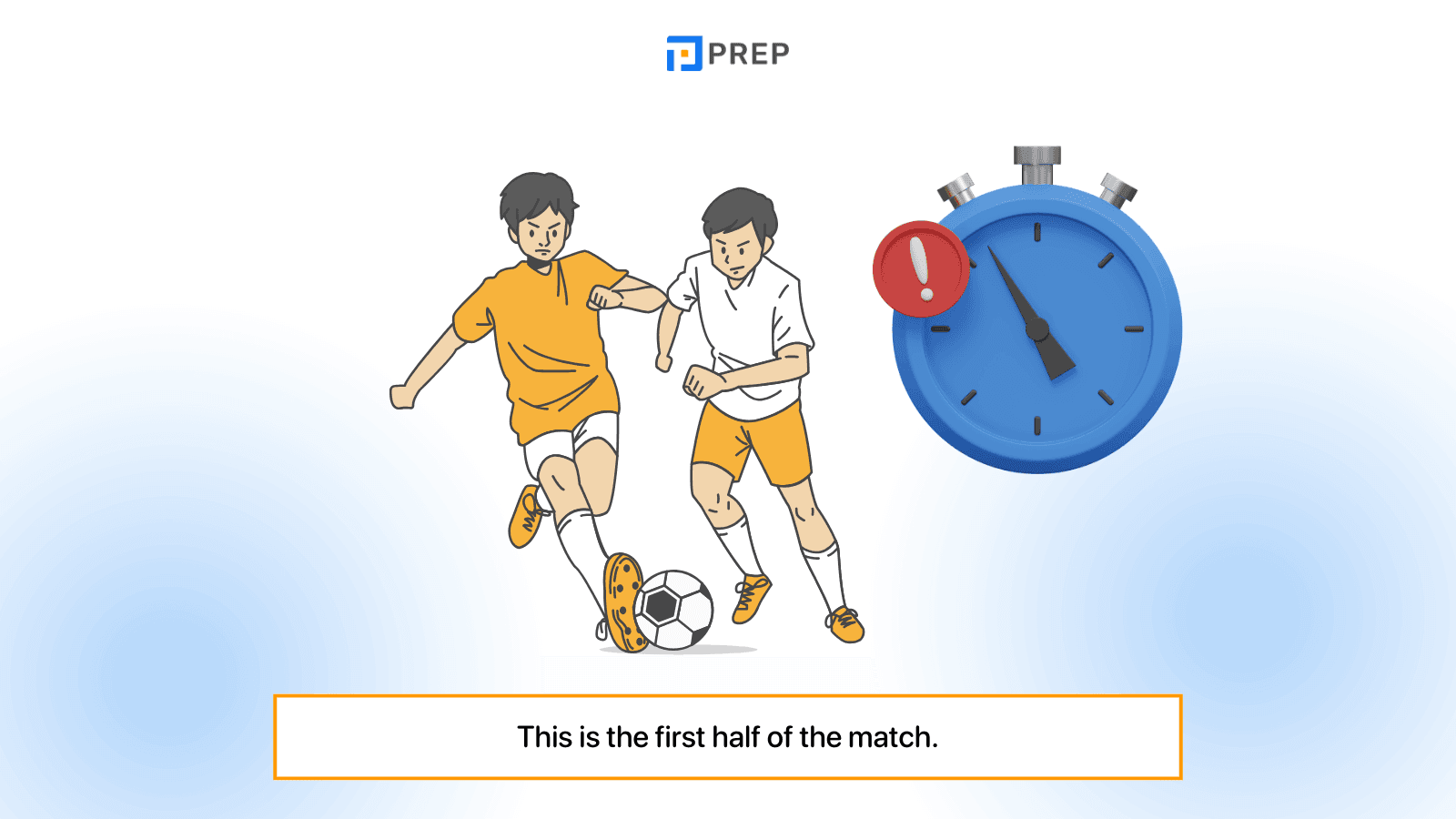
4. Clothing and Equipment in Football
Finally, let's learn some of the clothing and accessories that players typically wear in the football vocabulary:
|
No |
Word |
Meaning |
Example |
|
1 |
Armband /ˈɑːm.bænd/ |
A band worn on the arm of the team captain to signify their leadership role during a match. |
All captains wear armbands. |
|
2 |
Boot /buːt/ |
Specialized footwear designed for playing football, featuring studs or cleats for improved traction on the pitch. |
John forgets his boots and shin pads in order to play football. |
|
3 |
Shin pads/ Shin guards /ʃɪn pædz/ /ʃɪn ɡɑːrdz/ |
Protective gear worn on the shins to safeguard a player's lower legs from injury, especially from kicks and impacts during play. |
|
|
4 |
Glove /ɡlʌv/ |
Specialized gloves worn by goalkeepers to provide grip and protection while stopping and catching the ball. |
The goalkeeper wears gloves to catch the ball. |
|
5 |
Kit /kɪt/ |
The standard attire worn by players during a match, usually consisting of a jersey, shorts, and socks, often featuring the team's colors and logo. |
I was wearing football kit. |
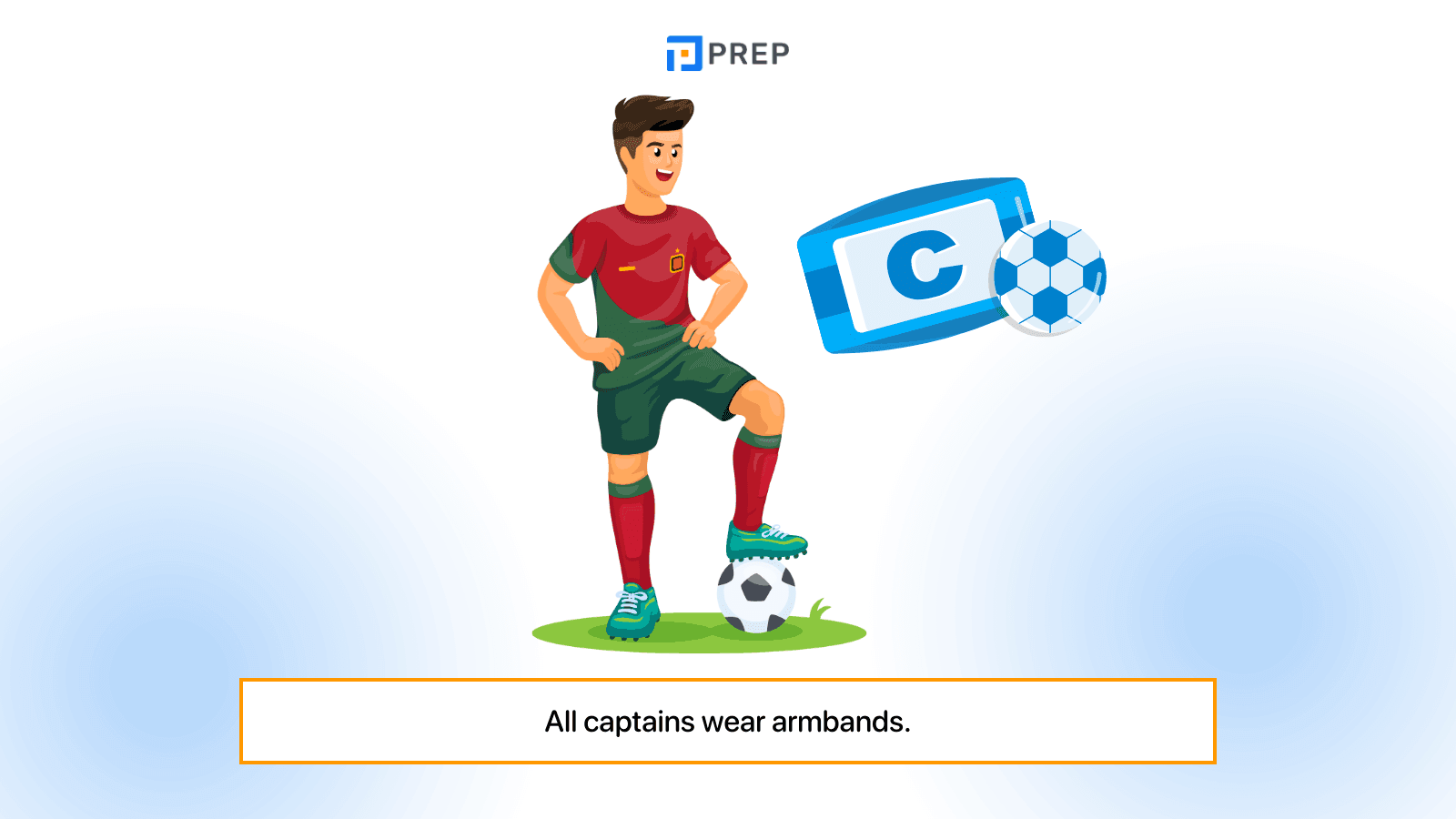
II. Names of Famous Football Tournaments and Teams in English
In addition to the football vocabulary mentioned above, let's explore the names of famous football tournaments and teams around the world with PREP!
1. Names of Football Tournaments
|
No |
Word |
Meaning |
Example |
|
1 |
The FIFA World Cup |
The international championship tournament for men's football organized by FIFA, held every four years and contested by national teams from around the world. |
The FIFA World Cup is held every 4 years. |
|
2 |
Euro |
Short for the UEFA European Championship; an international football tournament held every four years for national teams from Europe. |
The Euro tournament features the best national teams in Europe. |
|
3 |
UEFA Champions League |
The premier club football tournament in Europe, organized by UEFA, featuring the top teams from various European leagues. |
Teams that do not qualify for the UEFA Champions League can compete in the Europa League. |
|
4 |
Europa League |
An annual club football competition organized by UEFA for teams that do not qualify for the Champions League. |
|
|
5 |
Premier League |
The top tier of professional football in England, known for its competitive nature and featuring some of the best football clubs in the world. |
The Premier League is one of the most popular football leagues in the world. |
|
6 |
Copa America |
The main international football tournament for national teams in South America, held every four years. |
Copa America is the oldest international football tournament. |
|
7 |
La Liga |
The top professional football division in Spain, known for its high level of competition and famous clubs such as Barcelona and Real Madrid |
La Liga features some of the best clubs in Spain, including Barcelona and Real Madrid. |
|
8 |
Serie A |
The top professional football league in Italy, known for its tactical style of play and historic clubs like Juventus, AC Milan, and Inter Milan. |
Serie A is known for its tactical style of play. |
|
9 |
Bundesliga |
The top professional football league in Germany, renowned for its passionate fans and competitive clubs |
The Bundesliga is known for its impressive attendance and passionate fans. |
|
10 |
Ligue 1 |
The top professional football league in France, featuring clubs like Paris Saint-Germain and Olympique de Marseille. |
Ligue 1 has grown in popularity with the rise of Paris Saint-Germain. |
|
11 |
AFC Asian Cup |
The premier national team competition in Asia, organized by the Asian Football Confederation (AFC), held every four years. |
The AFC Asian Cup showcases the best national teams in Asia. |
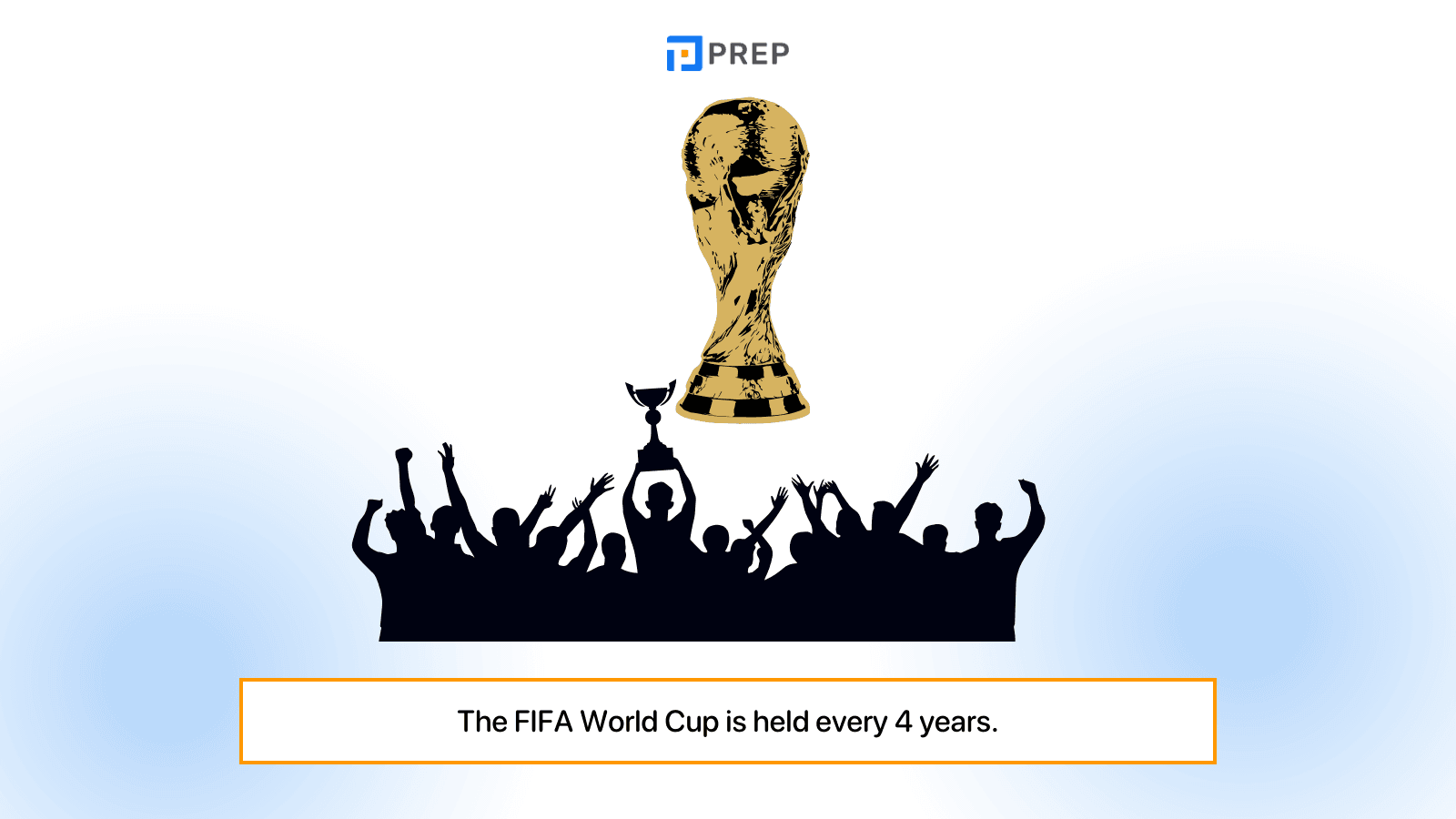
2. Names of Famous Football Teams
|
No |
Word |
Example |
|
1 |
Real Madrid /reɪˈɑːl məˈdrɪd/ |
Before being a fan of Real Madrid, I was a loyal fan of Manchester United. |
|
2 |
Manchester United /ˈmæntʃɪstər juːˈnaɪtɪd/ |
|
|
3 |
Barcelona /ˌbɑːrsəˈloʊnə/ |
Barcelona is my absolute favorite football club. |
|
4 |
Chelsea /ˈtʃɛlsi/ |
Chelsea has recruited great soccer players. |
|
5 |
Juventus /dʒuːˈvɛntəs/ |
Juventus is one of the most successful clubs in Serie A history. |
|
6 |
Bayern Munich /ˈbaɪərn ˈmjuːnɪk/ |
Bayern Munich Football Club is led by good coaches. |
|
7 |
Paris-Saint-Germain /ˌpærɪ ˌseɪnt ʒɜːrˈmæn/ |
I just watched the intense soccer match between Paris-Saint-Germain and its opponents on TV. |
|
8 |
Liverpool /ˈlɪvərˌpuːl/ |
I have an appointment to watch Liverpool's soccer match at 7 p.m tomorrow. |
|
9 |
Arsenal /ˈɑːrsɪnəl/ |
Arsenal is a professional football club based in Holloway, North London, England. |
|
10 |
Manchester City /ˈmæntʃɪstər ˈsɪti/ |
The score of Tottenham Hotspur and Manchester City was 1-2 in the first half. |
|
11 |
Tottenham Hotspur /ˈtɒtənəm ˈhɒtspɜːr/ |
|
|
12 |
Borussia Dortmund /bəˈrʊsiə ˈdɔːrtmʊnd/ |
Instead of hanging out, I stayed home to watch Borussia Dortmund's soccer match with my dad. |
|
13 |
Leicester City /ˈlɛstər ˈsɪti/ |
Leicester City shocked the football world by winning the Premier League in 2016. |
|
14 |
Atlético Madrid /ætlɛtɪˈkoʊ məˈdrɪd/ |
Atlético Madrid is known for its strong defensive style of play. |
|
15 |
Internazionale /ˌɪntərnætsiəˈnɑːleɪ/ |
Internazionale, often referred to as Inter, is one of Italy's top clubs. |
|
16 |
Everton /ˈɛvərtən/ |
Everton Club has participated in 117 seasons since its establishment. |
|
17 |
Roma/ AS Roma /ˈroʊmə/ |
A.S. Roma won the Serie A championship for the first time. |
|
18 |
Milan/ AC Milan /mɪˈlæn/ |
AC Milan's lineup for this tournament was just announced this morning. |
|
19 |
Napoli /ˈnæpəli/ |
Napoli is the most successful club in Southern Italy and has the 4th most fans in Italy. |
|
20 |
Schalke 04 /ˈʃælkə ˈzɪəroʊ ˈfɔːr/ |
Schalke 04 is ranked by Forbes magazine as the 14th most valuable football club in Europe. |
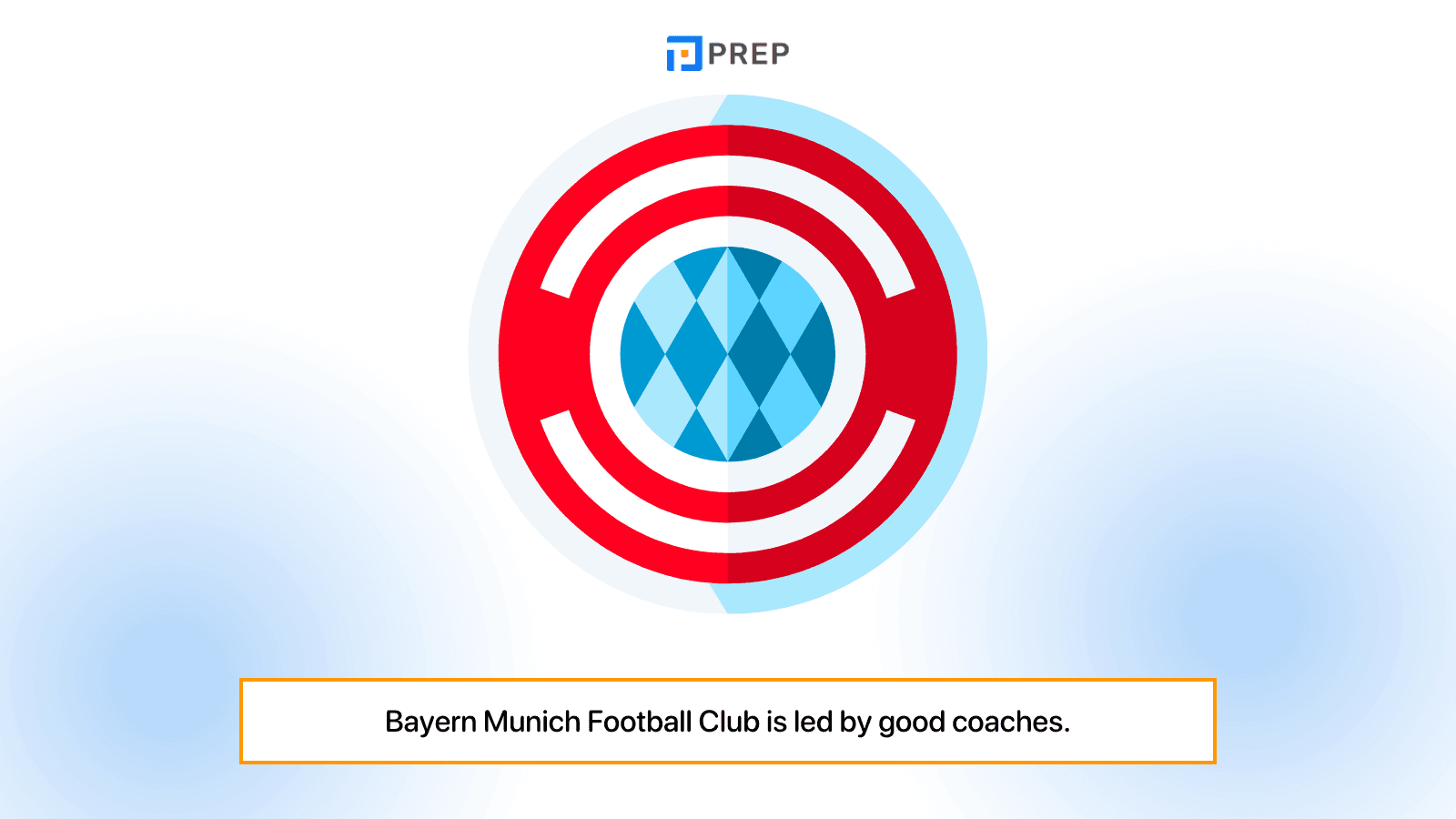
III. Idioms and Collocations Related to Football in English
In addition to learning the soccer English vocabulary, it's also essential to know some idioms and collocations associated with the sport. Here are some common ones:
|
No |
Phrase |
Meaning |
Example |
|
1 |
professional soccer |
The level of soccer played by individuals who are paid to compete, as opposed to amateur players, typically found in organized leagues and clubs. |
Harry retired from professional soccer in 2001. |
|
2 |
soccer coach |
An individual responsible for training and developing soccer players and teams, focusing on strategy, skills, and teamwork. |
In 1898, Martin became the soccer coach. |
|
3 |
soccer complex |
A facility that includes multiple soccer fields and amenities for the training, practice, and competition of soccer teams. |
A soccer complex was built in my city. |
|
4 |
keep your eye on the ball |
To pay close attention to something or to stay focused on a particular goal or objective. |
If Jenny wants to be successful in her job, she has to keep her eye on the ball. |
|
5 |
on the ball |
Quick to understand and react to situations; aware and alert, showing competence and skill in addressing tasks or challenges. |
Watching film till late last night made Kathy unable to be on the ball at work this morning. |
|
6 |
to score an own goal |
In soccer, this means to accidentally score a goal against one's own team. In a broader context, it refers to making a self-defeating or counterproductive decision that harms oneself. |
Jenny scored an own goal when she gave up a good opportunity. |
IV. Applying English football vocabulary in IELTS Speaking
In the IELTS Speaking test, topics related to sports, especially football, frequently appear. Therefore, we can effectively apply football vocabulary in our responses. Below are some sample IELTS Speaking Part 2 answers that incorporate football-related vocabulary aimed at achieving a high band score:
1. Talk about a football team you like
The football match that I consider indelible is actually one that I didn’t play in. During a local tournament which took place in my senior year at high school, my school’s team made it all the way to the semifinal. We faced another school at a stadium in the city’s outskirts to determine who would play in the final. That year, our team garnered considerable attention, because we’d never been regarded as championship material, but there we were, competing for a spot in the last match.
I was a member of my school’s football team and originally set to appear in the startling lineup. However, my hopes were dashed when I sprained my ankle a day before the match, which resulted in me being unable to play. The injury relegated me to watching from the sidelines, and I could recall feeling extremely disappointed at the circumstances.
My negativity eventually subsided when the referee blew the final whistle, as my team edged out our opponent with a two-to-one victory. The atmosphere was electric on our side, and our fans were so ecstatic at the result that they ran into the field to hug my teammates. The moment was truly worth celebrating for it meant we’d reached that tournament’s final for the first time in our school’s history.
Despite my setback, I was delighted as if I personally participated in the match. It was a bittersweet victory, but looking back at it now, I’m no longer bitter about this beautiful memory.
Some Advanced Football Vocabulary Used in the Sample Talk about a football team you like:
-
Indelible (adj.): Unable to be removed or forgotten; lasting and memorable.
-
Garner (v.): To collect or gather, often through effort or achievement; to obtain or acquire
-
Championship material (n.): A team or individual possessing the qualities and skills necessary to compete for a championship title
-
Starting lineup (n.): The predetermined list of players who are set to begin a match, representing a team
-
Sprain (v.): To injure a joint by twisting or stretching it beyond its normal range of motion, often resulting in pain and swelling
-
Dash one’s hopes (v.): To destroy or frustrate someone's aspirations or expectations; to make someone feel hopeless
-
Relegate (v.): To assign to an inferior rank or position; in sports, this often refers to lowering a team's division or league status
-
Sidelines (n.): The boundaries of the playing field; also refers to individuals who are not actively participating in the game or competition
-
Subside (v.): To become less intense, severe, or active; to gradually diminish
-
Edge out (v.): o narrowly defeat or win against an opponent in a competition
-
Ecstatic (adj.): Experiencing overwhelming happiness or joy; ecstatic delight
-
Bittersweet (adj.): Feeling pleasure mixed with sadness; an emotional response that has both positive and negative elements
2. Describe a live sport match that you have watched
In 2018, I happened to watch the final of the AFC U-23 Championship on TV. This tournament was held in Changzhou in winter, and unfortunately, the weather on that day was not in good condition at all. The snow was so heavy that the audience couldn’t really identify the Uzbekistan team since they were wearing white.
To talk more about the match, it was a fierce soccer game between two countries when the Uzbekistan team scored the first point after 15 minutes after the beginning of the game. After that, the Vietnam team made several attempts to gain some scores back, but they were all in vain.
However, when Uzbekistan players committed a foul, our team earned a free kick. At that moment, the coach chose Quang Hai as his trump card to do the kick. Unsurprisingly, the atmosphere was hyped up since he scored the first goal in the last few minutes of the first half.
During the second half, both teams increased their pace significantly, driven by their determination to secure victory. As I watched the match, I could sense the tension and excitement intensifying. However, a disappointing moment occurred when Uzbekistan scored their second goal from a corner kick. Witnessing the Vietnamese players in tears after the defeat was heartbreaking, especially considering how far they had come.
In the end, Vietnam was the runner-up in the Championship. Although I was a little bit sad when my country didn’t win, seeing the players putting all their effort into the competition made me feel proud.
Some Advanced Football Vocabulary Used in the Sample Describe a live sport match that you have watched:
-
final (n): The last match in a tournament or competition that determines the overall champion
-
in vain: A term used to describe an effort that has no successful results; a futile attempt
-
foul (n): An action that violates the rules of the game, typically involving illegal contact with an opponent
-
free kick (n): A direct kick awarded to a team after a foul is committed by the opposing team, taken without opposition from a designated spot
-
trump card (n): An advantage or resource that can be used to gain an upper hand in a situation, especially in competition
-
half (n): One of the two equal periods into which a match is divided, typically lasting 45 minutes in football
-
downbeat (adj): Feeling sad, pessimistic, or lacking in enthusiasm; characterized by a gloomy or depressed mood
-
runner-up (n): The competitor or team that finishes in second place in a contest or competition
This article provides comprehensive and detailed football vocabulary in English that PREP has compiled for you, along with common idioms and collocations associated with the sport. Be sure to save this information so you can apply it effectively in your exams! If you have any further questions or need additional assistance, feel free to reach out. Good luck with your studies!

Hi I'm Chloe, and I am currently serving as an Product Content Administrator at Prep Education. With over five years of experience in independent online IELTS study and exam preparation, I am confident in my ability to support learners in achieving their highest possible scores.
Comment
Premium content
View allPersonalized roadmap
Most read












